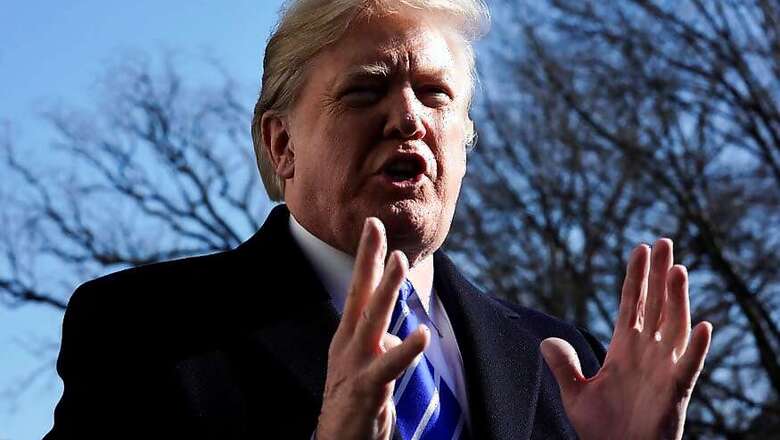
views
Washington: US President Donald Trump's administration named Russia on Monday as a bad actor on the world stage in a policy document that offers a sober analysis of Moscow as a rival despite Trump's own bid for warmer ties with President Vladimir Putin.
The criticism of Russia, laid out in a new national security strategy formed from Trump's "America First" foreign policy vision, reflects a view long held by American diplomats that Russia actively undermines US interests at home and abroad.
Excerpts of the strategy document released on Monday make no direct mention of US allegations that Russia meddled in last year's presidential election. A US federal investigation is also looking into whether Trump campaign aides colluded with Russia, something the Moscow and Trump deny.
Trump has frequently spoken of his desire for an improved relationship with Putin, even though Russia has frustrated US ambitions in Syria and Ukraine and done little to help Washington in its standoff with North Korea.
In the second such call in under a week, Putin spoke to Trump on Sunday to thank him for providing US intelligence that helped thwart a bomb attack in the Russian city of St Petersburg. On Thursday, Putin and Trump discussed the crisis in North Korea.
Congress mandates that every U.S. administration sets out its national security strategy. The new Trump strategy is influenced strongly by the thinking of top national security officials rather than that of the president himself, said one official involved in preparing the document.
Trump's strategy reflects his "America First" priorities of protecting the US homeland and borders, rebuilding the U.S. military, projecting strength abroad and pursuing trade policies more favorable to the United States, according to excerpts made available by the White House.
CLIMATE CHANGE
It drops former President Barack Obama's 2016 description of climate change as a US national security threat, aides said. Trump has vowed to withdraw the United States from the Paris climate accord unless changes are made to it.
Trump was to give a speech about the new strategy at 2 pm EST on Monday.
The Trump administration lumps together China and Russia as competitors seeking to challenge US power and erode its security and prosperity.
"They are determined to make economies less free and less fair, to grow their militaries, and to control information and data to repress their societies and expand their influence," according to excerpts of Trump's strategy released by the White House.
The singling out of China and Russia as "revisionist powers" reflects the Trump administration's wariness of them despite Trump's own attempts to build strong relations both with Putin and Chinese President Xi Jinping.
A senior administration official who briefed reporters said Russia and China were attempting to revise the global status quo - Russia in Europe with its military incursions into Ukraine and Georgia, and China in Asia by its aggression in the South China Sea. Russia denies the allegations that it meddled with the 2016 US presidential election.
The strategy will pledge to protect critical US infrastructure from cyber hacking and vow to "go after malicious cyber actors." Both China and Russia are often accused of cyber attacks against US targets, allegations they deny.
Trump has been working with Xi to exert pressure on North Korea over its nuclear and ballistic missile programs, but has made little progress on his vow to negotiate terms more favorable to the United States to lower a trade deficit that reached $347 billion in 2016.
The administration warned that intellectual property theft by China is a national security problem.
“We need to protect data in different ways. We need to ensure that the legislation we have, like CFIUS, is up to date and reflects the kinds of strategic investments that are taking place by other countries,” an administration official said.
The Committee on Foreign Investment in the United States (CFIUS), which reviews the purchase of U.S. assets by foreign companies, has recently taken a strong stand against technology transfers to Chinese companies.
In November, a bipartisan group of lawmakers in the Senate and House of Representatives introduced bills to toughen US foreign investment rules amid growing concern about Chinese efforts to buy US high-tech companies.



















Comments
0 comment